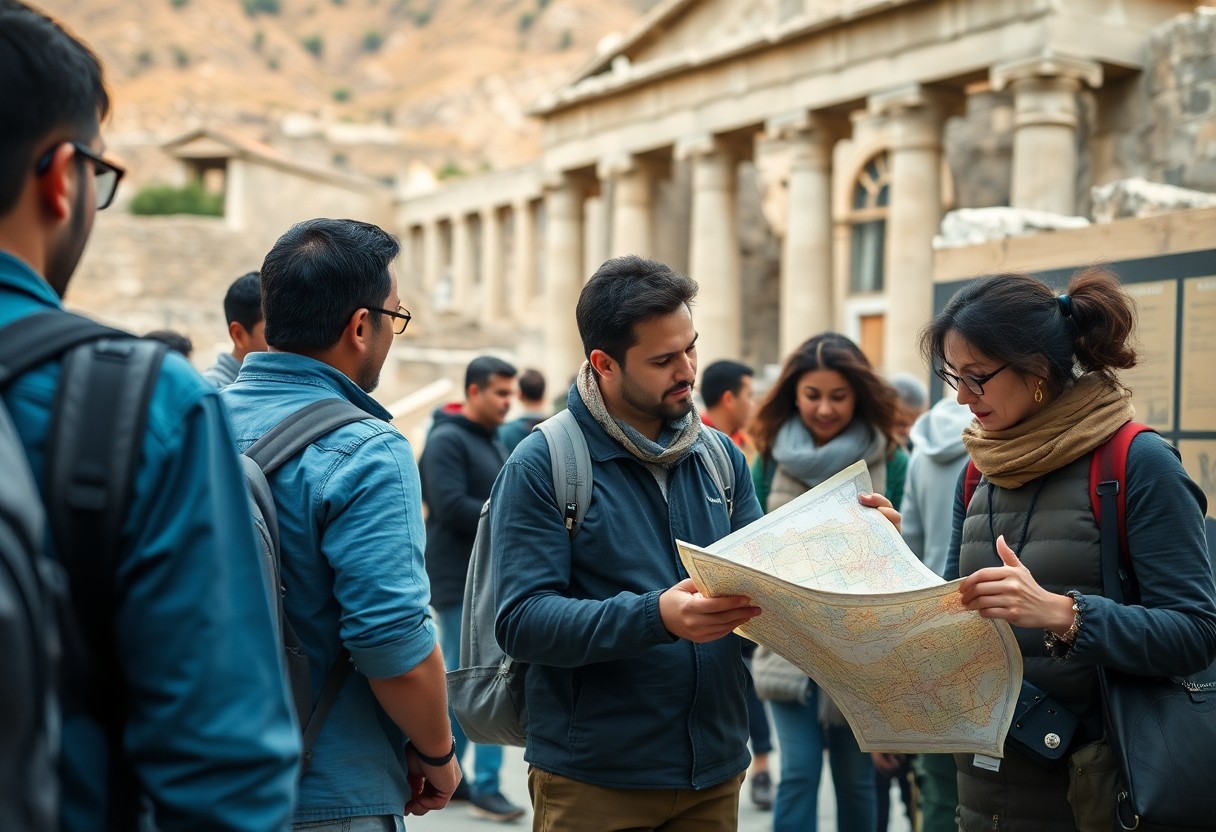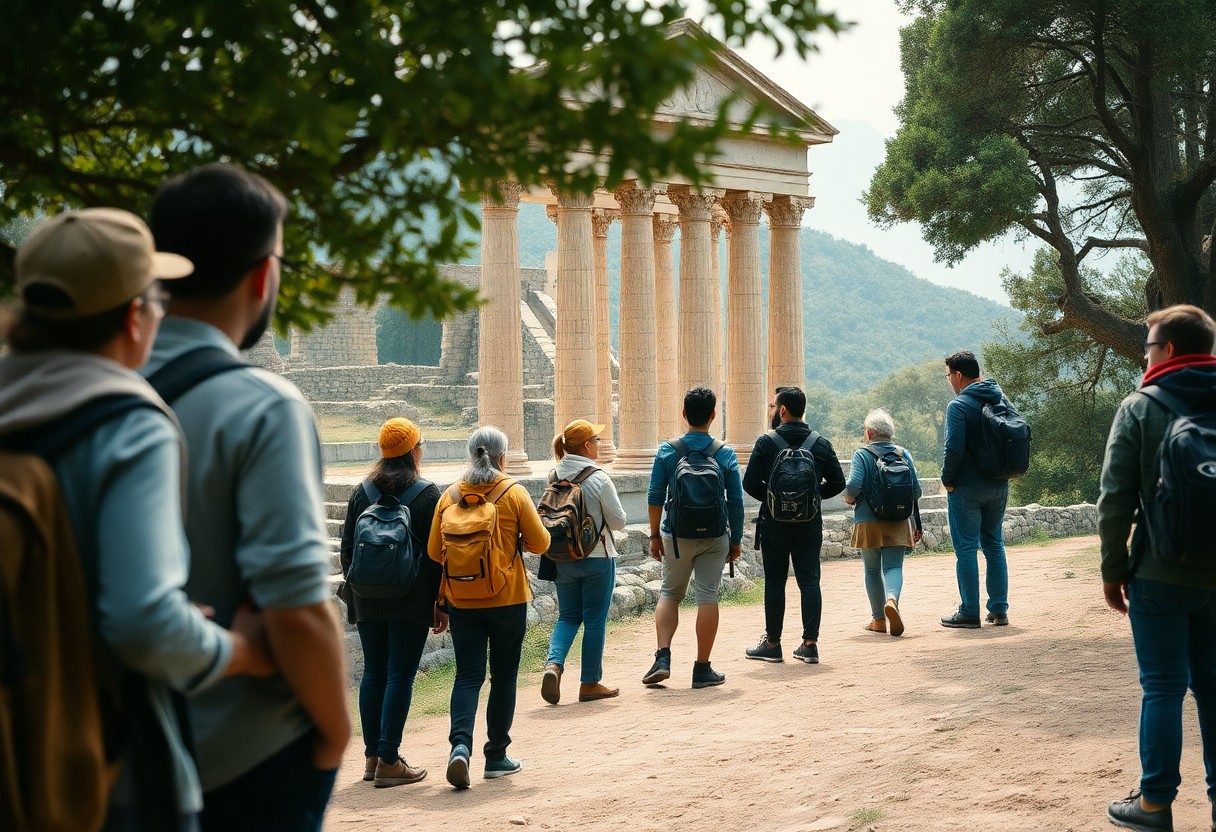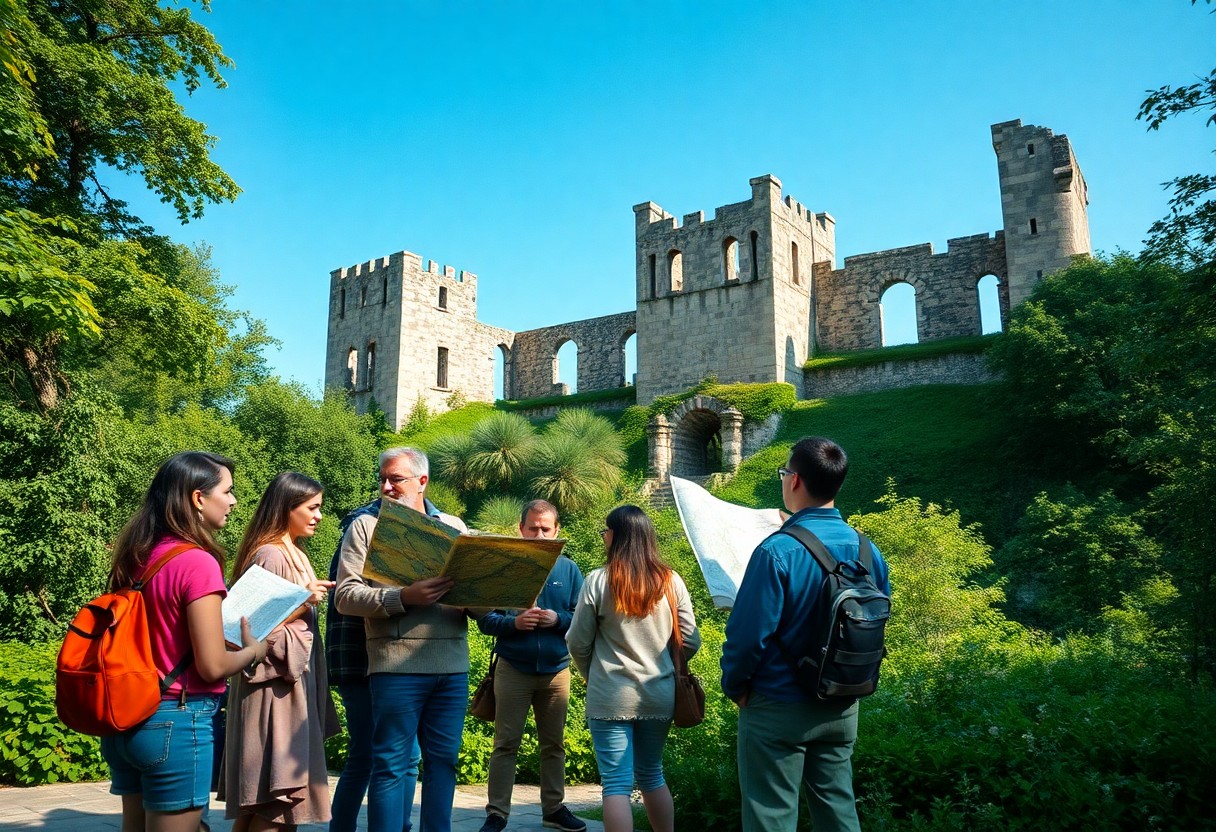
Tourism focused on heritage allows you to dive deep into your roots, uncovering the stories and traditions that shaped your family history and Historical Wanderlust for Ancestry Trace Seekers. By engaging in heritage tourism, you can visit ancestral sites, explore cultural landmarks, and connect with the past in meaningful ways. This immersive experience not only enriches your understanding of where you come from but also empowers you to preserve and celebrate your unique lineage for future generations.
Key Takeaways:
- Heritage tourism offers a unique opportunity for travelers to connect deeply with their ancestral roots by visiting historical sites, genealogical landmarks, and culturally significant regions.
- Exploring one’s heritage through tourism enhances personal identity and understanding of family history, often providing emotional and educational experiences that extend beyond traditional sightseeing.
- Effective ancestry trace seekers combine historical research with on-location exploration, utilizing local archives, museums, and community knowledge to enrich their genealogical journey.
- Planning a heritage tourism trip requires careful attention to cultural sensitivities, legal permissions for accessing certain sites, and strategic itinerary building to cover significant ancestral locations.
- Modern technology, such as DNA testing and online genealogical databases, complements heritage tourism by providing travelers with greater context and direction for their visits.
Tracing the Roots: The Historical Journey of Genealogy Tourism
Your pursuit of ancestral connections unfolds along a rich historical timeline where genealogy tourism emerged from early pilgrimages and heritage visits. Over centuries, seekers have traveled to birthplaces, ancestral villages, and historical archives, transforming private family quests into a broader cultural phenomenon. By understanding how these travels evolved alongside societal shifts, you can appreciate the blend of personal discovery and collective memory shaping modern heritage tourism.
From Religious Voyage to Ancestral Expeditions
Initially, many genealogical journeys began as religious pilgrimages, where travelers visited sacred sites linked to family histories or spiritual ancestors. Progressively, these trips shifted focus toward tracing familial roots beyond spiritual contexts, evolving into expeditions that mapped lineage through baptismal records, cemeteries, and homesteads. This transition reflects your opportunity to engage with your heritage not only spiritually but also through tangible historical landmarks connected to your ancestors’ everyday lives.
The Role of Literature in Shaping Travel Trends
Travel narratives and genealogical literature have long influenced how you approach heritage tourism. Works like Sir Walter Scott’s novels romanticized Scottish clans and ancestral pride, prompting waves of tourists to seek their own lineage in historical settings. Similarly, memoirs and family histories published in the 19th and 20th centuries popularized the notion of pilgrimage to one’s roots, crafting a language and motivation for heritage travelers like you to follow.
The literary impact extends beyond storytelling, shaping practical routes and destinations. Guidebooks such as Burton’s “Ancestral Lands” (published in 1929) outlined specific genealogical trails complete with archival resource locations and heritage sites, effectively framing how you plan and experience your journey. Contemporary travel writers continue this tradition, blending personal genealogical discoveries with cultural context, thereby inspiring you to engage with your past through an informed and narrative-rich pilgrimage.
The Motivations Behind Ancestral Adventures
Your drive to explore your heritage often stems from a blend of curiosity, emotional connection, and a desire for self-discovery. Many travelers bring with them stories passed down through generations, aiming to connect tangible locations with intangible family memories. This journey not only satisfies personal curiosity but aligns you with broader cultural narratives, enriching your sense of place in the world. Whether retracing a migration path or visiting ancestral villages, you uncover layers of history that shape both individual and collective identities.
Summary table synthesizing key data and insights on the heritage tourism market:
| Aspect | Details |
|---|---|
| Market Size (2024-2025) | USD 604.38 – 606.57 billion (2024); forecast USD 645.77 billion (2025) |
| Market Growth (CAGR) | 4.5% (2025-2030, Grand View Research); 7.4% (2025-2032, Coherent Market Insights); 7.8% (2025-2035, FMI) |
| Market Forecast (2030-2035) | USD 1,255.20 billion by 2032 (Coherent); USD 45.6 billion by 2035 (FMI, note different scope) |
| Key Market Drivers | Rising global interest in cultural and historical exploration; demand for immersive cultural experiences; growth in digital and AI-enabled ancestry tracing |
| Leading Market Segments | Cultural heritage tourism (~36.5% market share in 2025); ancestry tracing and experiential tours |
| Booking Channels | Online booking dominant with 63.2% market share in 2025 due to convenience |
| Demographic Insights | 51-70 age group holds 58.42% market share (2024); 31-50 age group growing at 5.3% CAGR; Millennials prioritize authentic cultural experiences (~60%) |
| Regional Highlights | North America holds ~25.54% of global revenue; strong heritage tourism in Europe, Africa, Asia, Oceania |
| Technological Innovations | AI-powered genealogy platforms, AR-enhanced museum tours, VR heritage experiences |
| Sustainability Focus | Increasing emphasis on sustainable and responsible heritage tourism practices |
| Major Players | ACE Cultural Tours Ltd., Exodus Travels Ltd., Expedia Group, BCD Travel, TUI AG, Context Travel, Smithsonian Journeys, Heritage Expeditions |
This table captures the market size, growth trends, key drivers, consumer demographics, technological trends, and regional market dynamics shaping the heritage tourism industry through 2035 based on multiple authoritative sources3457.
Citations:
- https://www.tourismnewzealand.com/assets/about/publications/performance/Tourism-New-Zealand-Statement-of-Performance-Expectation-2024-2025.pdf
- https://www.stats.govt.nz/topics/tourism/
- https://www.coherentmi.com/industry-reports/heritage-tourism-market
- https://www.futuremarketinsights.com/reports/heritage-tourism-industry-outlook
- https://www.grandviewresearch.com/industry-analysis/heritage-tourism-market-report
- https://www.mbie.govt.nz/immigration-and-tourism/tourism-research-and-data/tourism-data-releases/tourism-and-the-economy
- https://www.thebusinessresearchcompany.com/report/heritage-tourism-global-market-report
- https://www.e-unwto.org
Identity and the Quest for Belonging
Tracing your ancestry can solidify your sense of identity, especially when you uncover links to customs, languages, and traditions that resonate deeply. This exploration connects you to a community beyond your immediate surroundings, allowing you to belong to a lineage that spans time and geography. You might find a particular surname’s historical significance or a birthplace that ties you to longstanding cultural practices, reinforcing who you are through the continuity of your heritage.
Healing Historical Wounds: Travel as a Reckoning
Confronting painful histories through heritage tourism enables a form of personal and collective healing. Many seek to reconcile with past traumas—such as immigration hardships or oppression—by physically engaging with the landscapes where these events unfolded. Visiting former family homes, ancestral lands, or sites marked by historical conflict can provide insights and emotional closure, transforming abstract histories into personal narratives that foster understanding and empathy.
Engaging with ancestral sites burdened by historical injustice often prompts a profound emotional reckoning. For example, descendants of formerly enslaved people visiting plantations or memorials engage directly with the legacies of displacement and suffering inherited through generations. Similarly, those tracing relatives affected by war or forced migration encounter not only physical remnants but stories that reveal resilience and survival. This embodied encounter allows you to process inherited trauma and step toward repairing fractured identities, turning your journey into a powerful act of reconciliation and hope.
Crafting the Perfect Ancestry Itinerary
Tailoring your ancestry journey demands balancing time, location, and the depth of research. Prioritize sites with direct relevance to your lineage, such as birthplaces, ancestral homes, or local archives. Build in visits to regional museums or cultural festivals to enrich your experience. Flexibility helps—unexpected discoveries often offer the richest rewards. Incorporate time for interviews with local historians or distant relatives, and always allow extra days to dive deeper if new leads emerge. A well-structured blend of planned treasure hunts and spontaneous exploration will make your heritage travel both meaningful and memorable.
The Essential Research Toolkit
Arm yourself with resources like digitized census records, church registries, and immigration databases which are increasingly accessible online. Websites like FamilySearch and Ancestry.com complement physical archives you might encounter abroad. A portable scanner or a smartphone with a high-resolution camera helps capture documents and photographs. Maps, notebooks, and a sturdy GPS app facilitate onsite navigation and note-taking. Combining traditional paper tools with digital databases enhances your ability to verify facts and connect the dots across multiple sources efficiently.
Cutting-Edge Technologies for the Modern Traveler
Augmented reality (AR) apps now overlay historical information onto real-world landmarks, transforming visits into interactive storytelling experiences. DNA testing kits can link you to distant relatives and suggest unexplored regions tied to your genetic heritage. Cloud-based genealogy platforms synchronize data across your devices, so updates from on-site discoveries reflect instantly in your research. AI-driven record transcription tools speed up deciphering old handwriting, allowing quicker access to crucial documents. These innovations redefine how you build and enrich your ancestry narrative during travels.
For example, companies like MyHeritage offer AI-powered photo enhancement and colorization features that help visualize ancestors in vivid detail, connecting you emotionally to your past. Mobile apps like the HistoryPin project let you virtually step back in time by overlaying archival photos and stories onto current locations. Such tools not only save time but deepen engagement, transforming your heritage trip into a dynamic fusion of past and present that’s personalized, immersive, and unforgettable.
Heritage Hotspots: Where Ancestry and Tourism Converge
Your journey through heritage tourism uncovers vibrant locations where ancestral roots come alive, blending rich history with travel appeal. Places like Ireland’s County Kerry offer deep genealogical archives alongside lush landscapes, while Italy’s Tuscany combines art, heritage villages, and family histories that attract seekers worldwide. These hotspots serve not only as cultural time capsules but as living communities welcoming you to walk in the footsteps of your forebears, making your personal history tangible through immersive experiences and expert-led tours.
European Ancestral Meccas
France, Germany, and Scotland often top your list of European ancestral meccas, each harboring extensive parish records and DNA heritage tours. In Germany, you can visit the Black Forest region, tracing lineage through centuries-old church registries, while Scotland’s Highlands present clan gatherings and castle tours for deeper familial connection. These destinations combine genealogical research centers with local storytelling, guiding you toward uncovering centuries of your family’s cultural legacy amid picturesque, historically steeped settings.
The Rise of African Diaspora Pilgrimages
African diaspora pilgrimages now attract thousands who seek to reconnect with their roots in West Africa, Ghana’s Cape Coast Castle emerging as a symbolic gateway. Sites like this offer poignant reflections on the transatlantic slave trade, where you experience history through structured tours and cultural festivals. The surge in these pilgrimages reflects expanding interest in reclaiming identity and heritage, empowering you with descendants’ stories that resonate across generations and continents.
These pilgrimages deepen your understanding of African heritage by blending historical sites with vibrant local customs. Ghana’s Year of Return initiative in 2019 highlights this trend, welcoming over one million visitors, including African Americans tracing family lines disrupted by slavery. Participation in drumming ceremonies and storytelling sessions connects you to ancestral spirits, emphasizing resilience and cultural pride, while visits to museums and heritage centers provide context and why preserving these histories matters today.
Exploring Asian and Oceanic Heritage Trails
Asian and Oceanic regions reveal diverse heritage trails where ancestral roots intertwine with rich traditions. In Japan, the preservation of ancestral temples and family registries enhances your ability to trace lineage, while the Māori waka (canoe) traditions in New Zealand offer distinctive cultural pathways for heritage seekers. These trails encourage you to engage with living cultures and age-old rituals, providing a dynamic form of heritage tourism that connects past generations with contemporary identities.
Journeys across Asia and Oceania often involve engaging with community elders and participating in rituals that have been maintained for centuries. In Indonesia’s Toraja region, you can attend elaborate funeral ceremonies that tell stories of lineage and legacy, while in Taiwan, indigenous tribes welcome you to learn oral histories and ancestral craftsmanship. These interactive experiences enrich your personal heritage quest, connecting you to global narratives of migration, settlement, and cultural preservation.
Navigating Ethical Waters: Community and Cultural Sensitivity
Engaging with the heritage of your ancestors involves more than curiosity; it requires respect for the living communities connected to those histories. When you trace your lineage through cultural sites, you step into spaces that hold profound significance for current residents and indigenous groups. Actively engaging with local customs, seeking permission for photography or site visits, and supporting community-led tourism initiatives helps preserve the authenticity and dignity of these places while enriching your personal journey.
The Fine Line Between Exploration and Exploitation
Your ancestral exploration can inadvertently cross into exploitation if profit or curiosity overrides respect. Tourism that objectifies sacred sites or commodifies cultural rituals damages the very heritage you seek to honor. Strive to support ventures that involve local stakeholders directly, ensuring your visit enriches rather than disrupts local economies and traditions, maintaining an ethical balance between discovery and preservation.
Privacy Concerns in the Age of DNA Testing
DNA testing has revolutionized ancestry research but also raised significant privacy concerns. You may share sensitive genetic data with companies that could store, analyze, or even sell your information without explicit knowledge. Understanding privacy policies and opting for providers with stringent data protection measures safeguards your genetic legacy from unintended exposure or misuse.
Beyond immediate privacy issues, sharing your DNA data can have broader implications, including the possibility of genetic discrimination by employers or insurers and unintended revelations about family relationships. Several countries lack comprehensive legislation protecting genetic data, leaving you vulnerable. Engaging with organizations like the Genetic Alliance or reviewing the terms of services of testing companies enables you to make informed decisions about how your genetic information is handled and shared, maintaining control over your personal heritage.
Final Words
Upon reflecting on Historical Wanderlust for Ancestry Trace Seekers: A Comprehensive Exploration of Heritage Tourism, you gain insight into how deeply personal and enriching this journey can be. By retracing your roots and engaging with ancestral sites, you connect with history in a way that transcends traditional travel. This form of tourism not only broadens your understanding of your family’s past but also cultivates a profound appreciation for diverse cultures and stories. Embracing heritage tourism allows you to transform your curiosity into meaningful experiences that honor your legacy and identity.
Q: What is heritage tourism and how does it relate to ancestry trace seeking?
A: Heritage tourism involves traveling to locations that reflect the cultural, historical, and ancestral roots of individuals or communities. For ancestry trace seekers, it means visiting places where their ancestors lived, worked, or held significant cultural ties. This type of tourism allows individuals to connect more deeply with their heritage by exploring historical landmarks, museums, and cultural sites associated with their family history.
Q: How can one effectively plan a heritage tourism trip focused on ancestry research?
A: Planning a heritage tourism trip requires thorough preparation, including gathering as much information as possible about ancestral origins from family records, birth certificates, or genealogy databases. Identifying specific regions, towns, or landmarks connected to your heritage is imperative. It is also helpful to connect with local historical societies or genealogy groups in the destination area to access archives and gain insights from experts. Lastly, incorporating visits to museums, archives, and cemeteries can enrich the ancestry research experience.
Q: What types of experiences can ancestry trace seekers expect during heritage tourism?
A: Ancestry trace seekers can expect diverse experiences such as visiting ancestral homes, tracing family migration paths, exploring local cemeteries where forebears may be buried, and participating in cultural festivals that highlight traditional customs. They might also engage with local historians or genealogists who can provide additional context or unknown family links. Overall, heritage tourism offers an immersive emotional and educational journey that deepens understanding of one’s lineage.
Q: Are there digital resources that can enhance the heritage tourism experience for ancestry seekers?
A: Yes, many digital tools can support ancestry-focused heritage tourism. Online genealogy platforms like Ancestry.com and FamilySearch.org offer extensive databases for tracing family trees. Digital archives and historical records are often accessible through library portals and national archives websites. Additionally, virtual tours and apps related to historical sites can prepare or complement physical visits by providing context and background information before or during the trip.
Q: How does heritage tourism contribute to preserving cultural identity and history?
A: Heritage tourism encourages the preservation of cultural landmarks, traditions, and historical narratives by generating interest and financial support for their upkeep. When ancestry seekers engage with their heritage sites, they help sustain the stories and customs of their ancestors, fostering a sense of continuity and identity. Furthermore, this form of tourism often promotes education and intercultural understanding, benefiting both visitors and local communities by preserving intangible cultural heritage such as language, crafts, and rituals.






4 thoughts on “Historical Wanderlust for Ancestry Trace Seekers: A Comprehensive Exploration of Heritage Tourism”